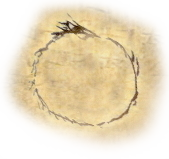Actions
Play Vocabulary
One performs actions to change the state of the world.
In general, to attempt any action is to essay it.
One thus makes an essay roll if there is difficulty in the action to be attempted. Conversely, there is no need to roll a dice if the activity is so trivial that success is guaranteed.
Most forms of movement count as an action (or essay), as does any attempt to wield or manipulate an item or entity, be it through gross physical power, or more subtle and perhaps magical means.
In the simplest form of the game, when essaying some action that has a chance of failure, one rolls a dice (which establishes the basic whimsy - that is, randomness, influence, or rule of the Deus upon the activity). Then, add to that result ones' relevant vital statistic (such as muscle, for a strength-based activity). In the basic game, the second component, the vital statistic, is treated as a fixed bonus (or perhaps a penalty). After that, thirdly, any other situational bonuses or penalties are accounted for (and these include effects from spells or feats). Lastly, if the difficulty is deemed high enough that only a supreme effort will suffice, the character can apply his or her will, spending one mana point for each additional point of willpower called upon (up to the limit of the character's will/willpower vital statistic. This choice of the use of will must be made before the action is taken.
Players take turns in rounds, each deciding their characters' movement and attempted activities. The Master of Ceremonies adjudicates each action, and moves play forward by calculating and describing the outcome of the players' essays.
Types of essay (action types)
Different types of actions ('essays' or 'rolls') are listed below:
Move (move action;movement essay): An essay to shift position or otherwise alter one's location. In many instances, a successful movement is guaranteed, and no dice roll is needed. A character or creature can move n units, where n is it's inherent Speed attribute, and this counts as an action. A character or creature is limited to a certain small number of actions on it's turn.
Essay roll: To try something of which there is no sure chance of success.
- [dPower] + [(d)Vital] + relevant bonuses or augmentations
A Combat Roll is an essay made in a combat situation.
- [dPower] + [(d)Vital] + [(d)Weapon] + relevant bonuses or augmentations
An Agility Roll is a dextrous essay depending primarily upon one's sinew.
- [dPower] + [(d)Sinew] + [...]
- ,,, or ...
- [dAgility] + [(d)Sinew] + [...]
A Body Roll? is an essay that depends on body size, muscles or guts .
- [dPower] + [(d)Muscle/Guts] + [...] (representing immune & nervous system)
- ... or ,,,
- [dBody] + [(d)Muscle/Guts] + [...]
An Opposed Roll is a essay roll that opposes another (such as an attempt in combat to use a club to strike a foe that is blocking with a shield). Opposed rolls are used when the essay roll of the instigating character or creature is performed against a reacting or defending dice roll by another player or the Game Master. This as opposed to the original essay being performed against a fixed Difficulty level. The basic pattern is:
- [dPower] + [(d)Vital] + [...] (perhaps a shield is relevant, or special evasion ability
An example of the opposed rolls described above:
- [dPower] + [(d)Muscle] + 2 [bone club]
- ... versus
- [dAgility] + [(d)Sinew] + 3 [buckler]
In the above examples, [dPower] is the power roll.
Continue onward, to the section on Difficulty.
See also:
